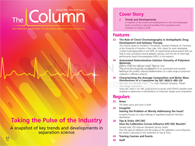Agilent and Imperial College London Announce Collaboration
Agilent Technologies Inc. and Imperial College London have signed a strategic scientific collaboration agreement that will see a broad range of Agilent instruments installed in a sponsored measurement suite to be housed within Imperial’s Molecular Sciences Research Hub.
Agilent Technologies Inc. (Santa Clara, California, USA) and Imperial College London have signed a strategic scientific collaboration agreement that will see a broad range of Agilent instruments installed in a sponsored measurement suite to be housed within Imperial’s Molecular Sciences Research Hub.
“Imperial College London plays a very important role in advancing a deeper understanding of the world through their lab instruction and research,” said Mike McMullen, Agilent President, and CEO. “We recognize the important contributions made by university scientific research to solve real-life challenges, from finding new ways to fight cancer, to ensuring the purity of food, to solving major environmental issues. It is an honour for Agilent to support Imperial in building an advanced scientific measurement and analytical laboratory on their new White City Campus. We value our partnership and look forward to taking this important step together,” he added.
Tony Cass, Professor of Chemical Biology in the Department of Chemistry and Institute of Biomedical Engineering at Imperial, has been appointed Director of the Agilent Measurement Suite. Cass will oversee the collaboration with an objective to develop and facilitate the translation of research, tools, and technology from academia to industry.
For more information, please visit: www.imperial.ac.uk and www.agilent.com

Removing Double-Stranded RNA Impurities Using Chromatography
April 8th 2025Researchers from Agency for Science, Technology and Research in Singapore recently published a review article exploring how chromatography can be used to remove double-stranded RNA impurities during mRNA therapeutics production.
The Effect of Time and Tide On PFAS Concentrations in Estuaries
April 8th 2025Oliver Jones and Navneet Singh from RMIT University, Melbourne, Australia discuss a recent study they conducted to investigate the relationship between tidal cycles and PFAS concentrations in estuarine systems, and offer practical advice on the sample preparation and LC–MS/MS techniques they used to achieve the best results.













